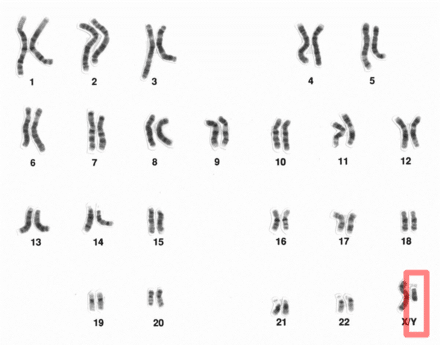
21 Jan Loss of Genes on Y Chromosome Can Predispose Men to Cancer
MedicalResearch.com Interview with:
Alejandro Cáceres PhD
Juan R. González, PhD
Barcelona Institute for Global Health (ISGlobal)
Barcelona, Spain.
MedicalResearch.com: What is the background for this study? What are the main findings?
Response: Men have more risk and worse prognosis to cancer than women. There are many environmental factors but also biological differences.
We find that the loss of function of six genes (DDX3Y, EIF1AY, KDM5D, RPS4Y1, UTY and ZFY) in chromosome Y is one of the biological factors for the differences between sexes in relation to cancer risk and prognosis.

Y Chromosome Image: Wikipedia
MedicalResearch.com: What should readers take away from your report?
Response: The chromosome Y is a small chromosome that can be lost during mitosis or can be damaged by environmental exposures. These processes are more likely to happen with aging. When chromosome Y loses its function it removes the protective role against cancer given by the genes we identified.
MedicalResearch.com: What recommendations do you have for future research as a result of this work?
Response: We would like to study the extent to which the loss of function of chromosome Y can be used as a clinical biomarker for risk and prognosis of cancer. One of the important questions that follow is, for instance, whether men who have lost chromosome Y function are better or worse responders to specific anticancer treatments.
MedicalResearch.com: Is there anything else you would like to add?
Response: Sex differences are common across multiple diseases. Therefore, much more is needed to design personalized treatments that take into account the differences between the sexes.
Citation:
Alejandro Cáceres, Aina Jene, Tonu Esko, Luis A Pérez-Jurado, Juan R González, Extreme down-regulation of chromosome Y and cancer risk in men, JNCI: Journal of the National Cancer Institute, , djz232, https://doi.org/10.1093/jnci/djz232
[subscribe]
Last Modified: [last-modified]
The information on MedicalResearch.com is provided for educational purposes only, and is in no way intended to diagnose, cure, or treat any medical or other condition. Always seek the advice of your physician or other qualified health and ask your doctor any questions you may have regarding a medical condition. In addition to all other limitations and disclaimers in this agreement, service provider and its third party providers disclaim any liability or loss in connection with the content provided on this website.
Last Updated on January 22, 2020 by Marie Benz MD FAAD
